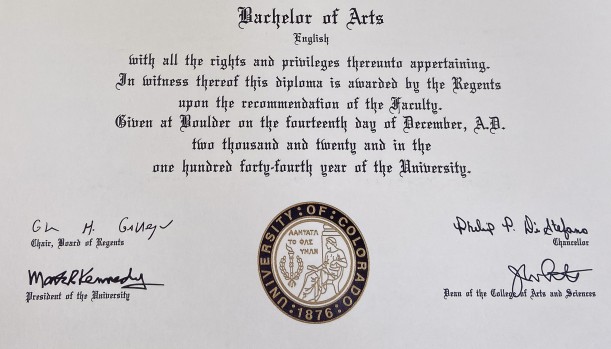Humanities Degrees In Free Fall

The Daily Record
Full disclosure: I was an English major.
The reaction I sometimes get to this revelation usually runs along the lines of poverty vows or money wasting, but the backstory to my academic path has some utility. In those days a journalism major at UNL was automatically also an English major.
You can fill in the blanks from there: While poised to be the next Walter Cronkite, I dabbled in the likes of Chaucer, Dickens, Faulkner, Shakespeare, Hemingway, poets from Ginsberg to Giovanni to Alighieri, the usefulness of rhetoric, Melville, Molière, Milton … the roll call a procession of brilliant writers and thinkers, some of whom I actually understood.
Thereby hangs a tale. While reading, discussing and writing about books and ideas accompanied me in college, I was initially a reluctant participant in the Arts and Letters universe. My preference — aside from a soft spot for American history and a few good books — was not the Humanities; my goals were getting scoops, exposing frauds and hypocrites or creating feature stories that moved someone to laugh, to cry or to act.
Eventually, I made an earnest peace with my English major and, by extension, the Humanities, not simply for instilling in me an appreciation of history, literature, languages, philosophy, fine and performing arts, media and culture. Even more important perhaps was the recognition that thinking creatively, embracing critical analysis, asking questions, and reasoning based on all three can not only explain the world, but also change it.
But first you have to start at number 149.
That’s where I found the English major on a list of the relative earning power of 159 college majors. I checked a number of other rankings and found that English majors in particular and Humanities degrees in general were usually near or at the bottom of initial earning power.
Surely that explains the precipitous drop in Humanities majors across the country. Two years ago, the National Center for Education Statistics reported that Humanities degrees had declined almost 30% from 2012 to 2020. They warn that the free-fall continues. According to the Atlantic, history majors are only nearly half of what they were since 2007, the same decline as English majors since the 1990s.
Bright spots are few but still bright, notably the University of California, Berkeley where Humanities majors are up over 40% in the last five years, and the University of Arizona’s College of Humanities, which has increased its enrollment by a third since 2016.
Trending is STEM — science, technology, engineering, math — driven by entry level salaries two or three times what an English major can earn teaching or parlaying a penchant for readable prose into a public relations or advertising copywriter gig.
Still, if you subscribe to the notion that a four-year college degree should prepare students for 40 years of work life, not just the first 10, English majors and their Humanities cohorts do better.
According to a number of surveys, STEM jockeys’ head starts fade steadily after their first jobs, and, unless you’re the boss, by age 40 the earnings of people who majored in fields such as English and history have caught up. That includes professional arenas such as law, where a background in language, analysis and rhetoric can be foundational.
Moreover, artificial intelligence (AI) continues its encroachment on the marketplace and the workshop. Unless you are creating the app or own it, my English major’s guess is that AI will compromise STEM before it will create something akin to “Things Fall Apart,” “The Jungle” or the Federalist Papers.
Yes, STEM is critical to keeping us competitive and progressive. Yet, as we are seeing with AI, our ability to create technology nearly always outpaces our ability to think about, analyze, and reason as to what its advent means for humanity. Maybe a Humanities major can help.
That’s because meaning often lies beneath or beyond the wizardry of our scientific genius or our industrial ingenuity. The Humanities sweet spot is critical analysis, detailed research and reasoned conclusions.
Some schools require a STEM major to be well-versed in the Humanities and vice versa. That’s a good idea. We need to understand how the universe works and how we can make it better as science searches for solutions to modern problems.
We must, however, also seek truth and beauty — the seeking part of the Humanities major’s journey — because in a world careening at speeds which often prioritize monetization and metrics, understanding might not be enough. We’ll eventually need meaning.
This story was originally published by Nebraska Examiner, an editorially independent newsroom providing a hard-hitting, daily flow of news. It is part of the national nonprofit States Newsroom. Find more at nebraskaexaminer.com.
Category:
User login
Omaha Daily Record
The Daily Record
222 South 72nd Street, Suite 302
Omaha, Nebraska
68114
United States
Tele (402) 345-1303
Fax (402) 345-2351




